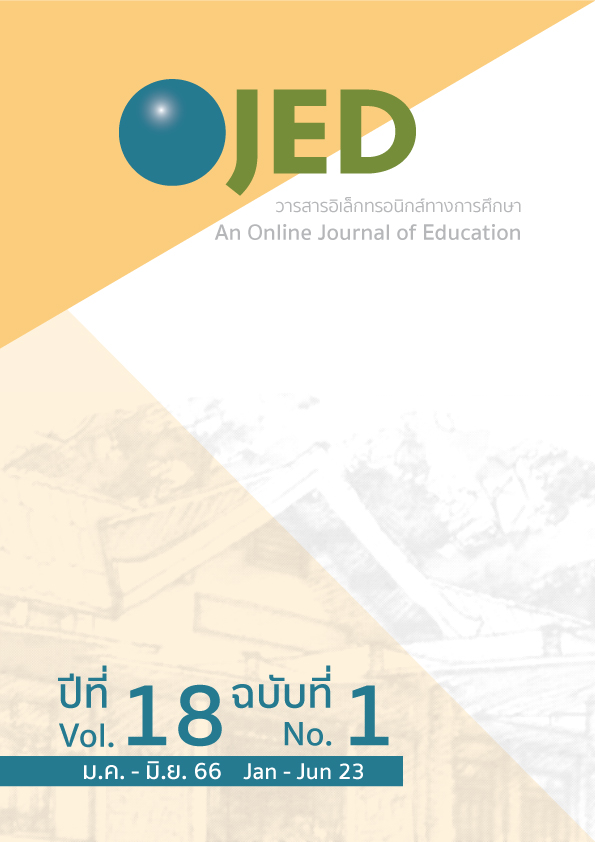Studying Key Factors and Models of Instruction of Vocal Music Interpretation for 9-11 Years Old Learners
DOI:
https://doi.org/10.14456/ojed.2023.3Keywords:
instruction of vocal music, music interpretation, 9-11 years old learnersAbstract
This qualitative research aimed: to study key factors and models of instruction of vocal music interpretation for learners aged 9-11 years old. Data were gathered from documents and in-depth interviews with seven key informants, obtained by purposive sampling, and analyzed using content analysis method. The results were divided into two sections. Section 1, the factors of instruction of vocal music interpretation consisted of 3 parts: 1) The skills related to and affecting the learning of vocal music interpretation, i.e., music skills, vocal techniques skills, movement skills, language and communication skills, and concentration control skills 2) The condition of song selection for teaching interpretation of singing songs, according to the learner development and elements of music that promotes learning of vocal music interpretation and 3) The other factors involved in song interpretation learning. Section 2, the models of instruction of vocal music interpretation for learners aged 9-11 years old, divided into three main steps,
1) understanding the form of the song by listening and reading 2) connecting to the song by correlating the learner's experience or imagination 3) communicating meaning through singing acting, and movement.
References
ภาษาไทย
กฤตธัช พิสุทธิวงษ์. (2561). การฝึกซ้อมและตีความบทเพลงอาเรียของฟิกาโรจากอุปรากรเรื่อง เลนอทเซดิฟิกาโร. วารสาร
ดนตรีและการแสดง , 4(1), 24-35.
ณรุทธ์ สุทธจิตต์. (2561). ดนตรีศึกษา: หลักการและสาระสำคัญ. (พิมพ์ครั้งที่10). โรงพิมพ์แห่งจุฬาลงกรณ์มหาวิทยาลัย.
ดวงใจ ทิวทอง. (2560). อรรถบทการขับร้อง: กระบวนแบบและนวัตกรรมการขับร้อง. วิสคอมเซ็นเตอร์.
พรรณทิพย์ ศิริวรรณบุศย์. (2563). จิตวิทยาพัฒนาการ. (พิมพ์ครั้งที่ 4). สำนักพิมพ์จุฬาลงกรณ์มหาวิทยาลัย
ศฤนห์ บุญช่วย. (2564). การตีความและเทคนิคการขับร้องที่สำคัญในทเวลฟโพเอ็มของเอมิลี ดิกคินสัน ประพันธ์ โดย แอรอน
คอปแลนด์. วารสารดนตรีรังสิต, 16(2), 16-28.
ศศินันท์ วิภูษิฑิมากูล. (2563). หลักการสอนเพื่อส่งเสริมการแสดงออกของวงขับร้องประสานเสียงระดับประถมศึกษาตอน
ปลาย [วิทยานิพนธ์ปริญญามหาบัณฑิต, จุฬาลงกรณ์มหาวิทยาลัย]. Chulalongkorn University Intellectual Repository (CUIR). http://cuir.car.chula.ac.th/handle/123456789/76679
ภาษาอังกฤษ
Brenner, B., & Strand, K. (2013). A case study of teaching musical expression to young performers. Journal
of Research in Music Education, 61(1), 80-96.
Boytim, J. F. (2014). The Private Voice Studio Handbook: a Practical Guide to All Aspects of Teaching, (Revised ed.). Hal Leonard.
Callaghan, J. (2019). Teaching the professional singer. In G. H. Welch, D. M. Howard and J. Nix (Eds.), The Oxford handbook of singing (pp. 651-666). Oxford University Press.
Christenson, P. G., de Haan-Rietdijk, S., Roberts, D. F., & ter Bogt, T. F. M. (2019). What has America been
singing about? Trends in themes in the U.S. top-40 songs: 1960–2010. Psychology of Music, 47(2),
–212. https://doi.org/10.1177/0305735617748205
Howard, D. M., & Hunter, E. J. (2019). Perceptual Features in Singing. In G. H. Welch, D. M. Howard and J.
Nix (Eds.), The Oxford handbook of singing (pp. 225–240). Oxford University Press.
Kramer, L. (2011). Interpreting Music. University of California Press.
Kramer, L. (2015). Song as Paraphrase. New Literary History, 46(4), 573–594. http://www.jstor.org/stable/ 24772760
Massey, A. (2021). The Four Core Areas. Oxford Singing Lesson: Vocal technique –Interpretation– Perfor
mance skills. https://www.oxfordsinginglessons.co.uk/my-approach/the-four- core-areas/
Nix, J. (2012). Commentary: vocal and choral music. In G. E. McPherson & G. F. Welch (Eds.), The Oxford
handbook of Music Education (pp. 551–558). Oxford University Press.
Nix, J. (2019). Singing Pedagogy. In G. H. Welch, D. M. Howard and J. Nix (Eds.), The Oxford handbook of
singing (pp. 225–240). Oxford University Press.
Phillips, K. H., Williams, J., & Edwin, R., (2012). The Young Singer. In G. E. McPherson & G. F. Welch (Eds.), The Oxford handbook of Music Education (pp. 954–609). Oxford University Press.
Sataloff, R. T. (2017). Vocal health and pedagogy: Science, Assessment, and Treatment (3rd ed.). Plural Publishing, Inc.
Silverman, M. (2007). Musical interpretation: philosophical and practical issues. International Journal of Music Education, 25(2), 101–117. https://doi.org/10.1177/0255761407079950
Thom, P. (2006). Toward a Broad Understanding of Musical Interpretation. Revue internationale de philo
sophie, 238, 437-452. https://doi.org/10.3917/rip.238.0437
Wagner, A. H. (1928). Interpretation in Singing. Music Supervisors’ Journal, 14(5), 69–71. https://doi.org/ 10.2307/3383325
Welch, G. F. (2005). The Musical Development and Education of Young Children. In B. Spodek & O. N.
Saracho (Eds.), Handbook of Research on the Education of Young Children (2nd ed.). https://doi.org/10.4324/9781315045511
Welch, G. F., & Preti, C. (2019). Singing as inter- and intra-personal communication. In Welch, G. F., Howard, D. M., & Nix, J. (Eds.), The Oxford handbook of singing (pp. 369–391). Oxford
University Press.
Williams J. (2012). Teaching Singing to Children and Young Adults (2nd ed.). Compton Publishing, Ltd.
Downloads
Published
How to Cite
Issue
Section
License
Copyright (c) 2023 An Online Journal of Education

This work is licensed under a Creative Commons Attribution-NonCommercial-NoDerivatives 4.0 International License.




